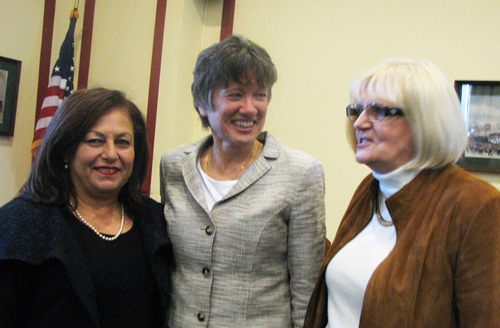ASME Co-Hosts 'Engineering Emergency' Capitol Hill Briefing on STEM and Minorities
ASME Co-Hosts 'Engineering Emergency' Capitol Hill Briefing on STEM and Minorities

On Feb. 19, ASME co-hosted a STEM Salon on Capitol Hill to mark the release of "Engineering Emergency: African Americans and Hispanics Lack Pathways to Engineering," the most recent data release from Change the Equation (CTEq), a nonprofit, nonpartisan, CEO-led initiative that is mobilizing the business community to improve the quality of science, technology, engineering and mathematics (STEM) learning in the United States.
ASME President Madiha El Mehelmy Kotb attended the event on behalf of the Society. Speaking in support of the report, she observed, “ASME is committed to achieving a truly diverse and inclusive science, technology, engineering, and mathematics workforce in the U.S. and all over the world. With the predicted changes in future U.S. workforce demographics, increasing the participation of women and underrepresented groups in the U.S. STEM workforce must become a 21st Century national imperative.”
“By dramatically improving the participation of women and talent from other under-represented groups in the STEM workforce, the U.S. can leverage the diversity of these individuals to fuel the innovation necessary for our global competitiveness, as well as meet the challenges of a changing world,” she added.
ASME Past President Victoria Rockwell was also in attendance at the event in her role as chair of the American Association of Engineering Societies.
The new report “Engineering Emergency: African Americans and Hispanics Still Lack Pathways to Engineering” explores gaps in the engineering pipeline. New data reveal disturbing trends in engineering degree attainment for people of color, trends that point to continued challenges of educational opportunity and access. The result: a failure to tap the creative potential of millions of Americans at a time when the nation is struggling to remain at the forefront of innovation.
Among the data points included in the new release are the following:
- African Americans and Hispanics comprise a third of the college-aged population, yet together they earn fewer than 16 percent of all engineering degrees and certificates. Though their college-aged population has grown since 2001, their share of degrees and certificates remained mostly flat.
- By 2022, nine in 10 new engineering jobs will require at least a bachelor's degree, yet most of the engineering credentials African American and Hispanics earn are below the bachelor's level. The reverse is true for Caucasians.
- While Hispanic and African Americans face hurdles in engineering, they are not on the same trajectory. Since 2001, Hispanics have been making strides in engineering degrees at the bachelor's level and higher, while African Americans have fallen back.
CTEq CEO Linda Rosen moderated a panel discussion examining the present and future workforce implications of this opportunity shortage. Panelists at the session included Gayle J. Gibson, director of engineering at DuPont; Ioannis Miaoulis, president and director of the Museum of Science in Boston; and Robert L. Curbeam Jr., vice president of mission assurance at Raytheon Co.
The event’s other co-hosts included the American Society for Engineering Education, the American Society of Civil Engineers, DiscoverE, IEEE-USA, the National Action Council for Minorities in Engineering, the National Center for Technological Literacy at the Museum of Science Boston, and the Society of Women Engineers.
Watch a video of the STEM Salon briefing on YouTube here. To read the new data release, visit http://changetheequation.org/engineering-emergency.
— Melissa Carl, ASME Government Relations

.png?width=854&height=480&ext=.png)




